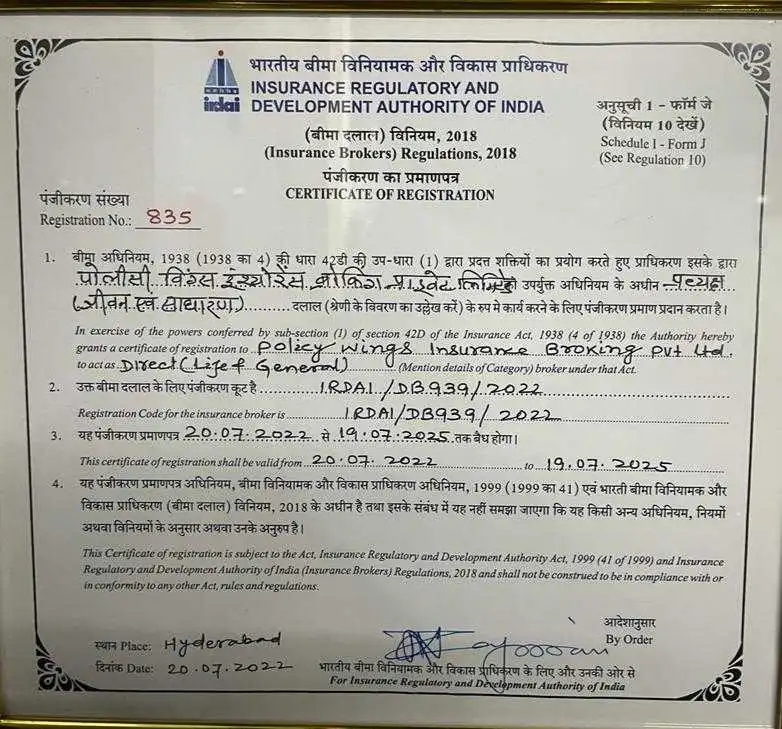Health Insurance Claim
Health Insurance Claim
Health insurance is designed to help in reducing the costs of medical care and provide a safety net for health issues. In 2021, health insurance schemes in India covered around 514 million individuals, representing only 37% of the country’s population. There are different situations where you would need to file a claim with your insurance policy, such as planned or unplanned visits to the hospital. You can submit a claim in two ways: through a cashless process or reimbursement.
Understanding the specific procedures for these claims to have a hassle-free experience and comply with the insurance company’s guidelines is essential. When you are hospitalised or face a medical emergency that requires expenses, your health insurance policy becomes active. If the policy covers the costs, it is considered a health insurance claim, and the insurance company pays for the medical expenses resulting from the medical issue.
Types Of Health Insurance Claims:
Due to the increasing number of health-related problems, treatment costs have significantly increased. Consequently, there is a growing demand for health insurance plans. As a result, various types of health insurance policies are available in the market to help improve the financial burden. These insurance plans enable individuals to access quality healthcare and provide peace of mind by reducing expenditure. However, choosing the appropriate insurance plan can be challenging due to the many options available today.
- Hospitalisation Claim:
A health insurance policy with a hospitalisation claim provides coverage when they become sick and require hospitalisation. The objective of a hospitalisation claim will cover various expenses related to sudden illnesses or accidents, including hospitalisation, diagnostic tests, and surgical costs. These expenses are collectively referred to as ‘hospitalisation expenses.’However, there are also costs associated with being ill before being admitted to the hospital, categorised as pre- and post-hospitalisation expenses. Most comprehensive individual and family health insurance plans, typically include coverage for these expenses.
- Hospitalisation Death Claim:
In the hospitalisation death claim, the other family members will still have coverage if the primary insured person passes away. It is because a hospitalisation death claim provides coverage for all family members under one policy. However, it is essential to inform the insurance company about the death of the primary insured person so that the policy can be updated accordingly. - Accidental Claim:
All health insurance plans include coverage for accidental injuries, which covers the medical costs associated with treating injuries sustained in a road accident. This claim typically includes charges for emergency hospitalisation and ambulance services. Some claims also cover expenses for post-hospitalisation treatments like consultations and physiotherapy that result from accidental injuries.Specific accidental claims may also provide a daily cash allowance for hospitalisation. It is important to note that health insurance plans offer immediate coverage for emergency unexpected hospitalisation without any waiting period. However, personal accident coverage is not included in regular health insurance plans and must be obtained separately through a personal accident insurance plan.
- Critical Illness claim:
The critical illness claim provides coverage for life-threatening diseases by offering a predetermined lump sum amount. This claim includes specific health conditions diagnosed with any of the predetermined medical conditions. Hospitalisation is not necessary to file a claim under this category. Only the disease diagnosis is required to receive the benefits of the claim.The amount to be paid is predetermined and does not depend on pre- or post-hospitalisation expenses. The following is a list of all the critical diseases covered under the Critical Illness claim:
1. Kidney failure
2. Primary pulmonary arterial hypertension
3. Stroke
4. Paralysis
5. Major organ transplant
6. Cancer
7. Aorta graft surgery
8. First heart attack
9. Multiple sclerosis
10. Coronary artery bypass surgery. - Claim For Daycare Procedures:
Many health insurance policies now cover daycare treatment procedures that take less than 24 hours. However, not all insurance companies protect all daycare procedures, so checking what types of daycare treatments are covered before purchasing a policy is essential. Daycare treatment procedures include medical operations, treatments, and surgeries that require less than 24 hours of hospitalisation.Examples of daycare procedures include radiotherapy, cancer chemotherapy, angiography, and appendectomy. While most health insurance policies generally have daycare coverage, the specific list of covered procedures may vary among insurers. Here are some commonly covered daycare procedures:
1. Septoplasty- Nose
2. Cataract- Eyes
3. Adenoidectomy- Throat
4. Angiography, Chemotherapy, Radiotherapy- Others
5. Appendectomy- Gastro
6. Piles/fistula- Rectal. - Pre And Post-Hospitalisation Claim:
Most health insurance hospitalisation claims focus on covering the costs of being hospitalised. However, by having a comprehensive policy, you can receive additional advantages that extend beyond just hospital expenses. It includes coverage for medical costs before and after hospitalisation, known as pre- and post-hospitalisation expenses. Here is the description:
1,Pre-Hospitalisation Claims: Medical expenses occur before a patient is admitted to the hospital. It involves tests and procedures conducted to diagnose a patient’s condition before they receive treatment in the hospital.
Examples include diagnostic tests, X-rays, medication, CT scans, investigative procedures, MRIs, angiograms, and more. These expenses incurred within 30 days before hospitalisation are covered, but this coverage may vary depending on the insurance company.
2. Post-Hospitalisation Claims: In most cases, the treatment and recovery process does not end immediately after leaving the hospital. Post-hospitalisation expenses refer to the costs incurred after a patient is discharged from the hospital.
It includes diagnostic tests, follow-up treatments, medical consultations, medication, and other related expenses. Health insurance policies typically cover these medical costs for 45-90 days after hospital discharge.
Types Of Hospitalisations That Can Be Claimed Under Health Insurance:
A health insurance claim is a formal request made by an individual who holds a health insurance policy, asking their insurance provider to cover the costs of medical services and benefits specified in their policy. This claim can be submitted for different types of hospitalisations:

A planned hospitalisation refers to a situation where the policyholder is aware of their upcoming hospital stay in advance. Typically, it is necessary for treating a pre-diagnosed illness or medical condition. In such instances, the policyholder must notify the insurance company about the planned hospitalisation at least 48 hours before their admission.

An emergency hospitalisation refers to a sudden and unplanned admission to a hospital. Usually, emergency hospitalisation becomes necessary when the insured individual is involved in an accident and requires immediate hospital care. In such instances, the insured person’s family is instructed to contact the health insurance provider within 24 hours of the patient’s admission to the hospital.
Things To Keep In Mind To Avail A Health Insurance Claim:
Health insurance is a vital protection plan to save lives and ensure financial stability during medical issues. With the increasing cost of healthcare, it is essential to consider the efficiency of the claim settlement process when purchasing a health insurance policy. It is advisable to always check the settlement ratio of insurers before claiming a health insurance plan. Here are some crucial aspects to consider while filing the health insurance claim:
- Validity Of Health Insurance:
It is crucial to remember that you can only submit a health insurance claim if you have a valid medical insurance plan. If your plan has expired and you still need to renew it, the insurance company will not consider any claims made on that plan. Therefore, it is essential to be aware of your medical insurance plan’s validity and ensure to renew it on time. - Included And Excluded Terms And Conditions:
It is crucial to thoroughly review and understand the inclusions and exclusions of your health insurance plan. Reading the entire policy document and taking note of these details is essential to comprehend the extent of your coverage entirely. Additionally, this process helps you choose the most appropriate health insurance plan for yourself and your family. - Waiting Period And Coverage Terms Of Health Conditions:
While certain illnesses are included in a standard health insurance policy, others are not. For example, all medical insurance plans may not cover pre-existing conditions and serious diseases. Even if these illnesses are covered, there may be a waiting period before the coverage takes effect.
Therefore, obtaining a health insurance plan that covers it explicitly is advisable if you have a pre-existing condition. Additionally, you can enhance your coverage by purchasing an additional medical insurance add-on for critical illnesses. - Other Important Details:
When filing health insurance claims, it is crucial to remember certain additional information. If the cashless pre-authorisation request is filed correctly, it may be allowed. It is vital to inform the insurance company about your hospitalisation as soon as it occurs.
All reimbursement claims must be submitted within 20 -30 days of discharge from the hospital. To claim post-hospitalisation expenses, the policyholder must provide all relevant documents within the specified time limit set by the insurer.
Health Insurance Claim Process:
The main objective of a health insurance plan is to offer financial aid for medical services. Individuals must submit a health insurance claim to receive this assistance when necessary. There are two types of claims that policyholders can file.
Here are the details:
- Cashless: In this claim, the insurance company takes responsibility for paying all the medical expenses directly to the hospital. However, the insured individual must be admitted to a hospital within the network to receive the advantages of cashless hospitalisation.
- Reimbursement: In this procedure for making a claim, the policyholder is responsible for paying the hospitalisation costs directly when they leave the hospital and then seeks reimbursement from the insurance company afterwards. Requesting reimbursement for expenses incurred at the network and non-network hospitals is possible.
For Both Planned And Emergency:
Here is the process of filing the planned and emergency health insurance claim. Below are the details:
- Planned:
The process for obtaining a planned hospitalisation claim under a health insurance policy needs the following steps:
1. To be admitted to a hospital as part of your insurance company’s network, please get in touch with the insurance helpdesk.
2. Present the identification health card issued by your insurer for verification purposes.
3. The hospital will confirm your identity and provide a pre-authorisation form for treatment without needing cash payment.
4. Complete the pre-authorisation form and hand it in at the insurance counter.
5. Your health insurance provider will receive the pre-authorisation form from the network hospital.
6. The insurance company will assess your pre-authorisation request and associated paperwork and grant approval for your cashless claim based on the terms and conditions outlined in your health insurance policy. In some cases, insurers may even provide a selected field doctor to simplify the process of approving cashless claims.
7. When you are ready to leave, make sure to settle the medical costs that are not included in your health insurance plan.
8. According to the terms and conditions of your policy, the hospital will receive the claim amount directly from your insurance company. - Emergency:
To file a claim for emergency hospitalisation under your health insurance policy, please follow the steps provided below:
1. It is essential to quickly inform your health insurance provider about your hospital stay.
2. Take medical care at the hospital.
3. Settle the complete hospital expenses and gather all the necessary paperwork at discharge.
4. Please ensure you provide all the necessary paperwork to your health insurance provider.
5. The insurance company will carefully examine all the documents you have submitted and manage your claim according to the terms and conditions outlined in your health policy.
6. Once your claim is authorised, payment for the claim will be issued to you.
Claim Intimation:
If you require a scheduled treatment, it is vital to inform the insurance company in advance. This notification should be made at least 3 to 4 days before hospitalisation. You must complete and submit a pre-authorisation form to the insurance company, which serves as a notification for your claim.
The form should be completed and submitted 3 to 4 days before planned hospitalisations. In a medical emergency where immediate hospitalisation is necessary, informing the insurance company and submitting the pre-authorisation form within 24 hours of being admitted is crucial.
Claim Status Check:
The most effective method to verify the progress of a health insurance claim is to contact the claim support team or access the website of your insurance provider. You could also get their claim assistance team if you obtain your policy through the insurance website portal. Another option is to visit the health insurance claim page to obtain information about the status of your claim.
Documents For Health Insurance Claim:
- Hospitalisation Claim:
Below is the given list of documents necessary for filing claims for planned and emergency hospitalisation claims:
1. Original claim form attested with your signature.
2. Identity proof
3. Prescription of a doctor confirming the hospital treatment
4. Treatment ensures consultation, diagnostic tests, and medicines.
5. Internal case papers
6. Ambulance papers
7. Original pharmacy bills with seals
8. Policy details include policy number, insurer’s name, address, and medical conditions and treatment.
9. Additional verifying documents (if needed). - Hospitalisation Death Claim:
Here are the documents required for filing the hospitalisation death claim:
1. Original claim form attested with nominee sign
2. Identity proof
3. Original Death certificate.
4. Internal case papers
5. Ambulance receipt
6. Actual pharmacy bills with seals (in case required)
7. First Information Report (FIR) (as required)
8. Policy details include policy number, name of the policyholder, address, and medical conditions and treatment.
9. Additional verifying documents (if needed). - Personal Accidental Claim:
The essential documents needed to file the accidental claim are:- Complete Policy Papers with insurer and insurance company details
- Complete the claim form with your signature
- Doctor’s Consultation
- Cancelled cheque with account details for the transfer of the reimbursement
- KYC papers
- Bills and receipts of medication prescribed by a doctor
- Original invoices and reports of medical tests such as X-rays, CT scans, Blood Reports, Ultrasound, etc.
- Copy of FIR/Medico-Legal Certificate with details of the accident
- Discharge summary.
- Critical Illness claim:
The critical illness claims need the below-listed documents:- Health Card issued by the health insurance company
- Complete consultation records of doctor and specialist
- Properly filled in and signed the claim form
- Original examination and diagnosis reports like MRI, CT scans, blood reports, etc.
- Original hospital bills and payment receipts with hospital seal
- Original pharmacy invoice and payment receipts with prescribed medication.
- Complete discharge summary
- Additional documents if needed.
- Claim for daycare procedures:
Here are the documents necessary to claim health insurance for daycare procedures:- Original health insurance documents.
- Original consultation and diagnosis papers with doctors’ prescription
- Filled claim form with your signature.
- Consultation, medical tests, and hospital bills with original payment receipts
- Pharmacy bills with original receipts
- Overall discharge summary
- Additional details, if needed.
- Pre And Post Hospitalisation Claim:
The pre and post-hospitalisation claim requires:
1. Valid health insurance card
2. Necessary OPD consultation papers of doctor
3. Claim form filled with required details and signature
4. Medical test and diagnosis reports of tests like ECG, CT scans, Ultrasound, X-rays, urine and blood reports, etc.
5. Original hospital bills with sealed and signed payment receipts
6. FIR (in case of accidents) or Medico Legal Certificate (MLC) (if required)
7. Original Pharmacy bills with payment receipts
8. Hospital discharge details with doctors’ sign
9. Additional documents, if needed.
How To Claim From Multiple Insurers?
If you have health insurance coverage from multiple insurers, you can file a cashless claim with one insurer to cover all your medical expenses. After the first insurer settles your claim, you can approach the second insurer to cover the remaining costs.
To do this, you will need to provide the second insurer with the claim settlement summary from the first insurer and the verified hospital bills and payment receipts. The second insurer will assess your claim based on the terms and conditions of your policy and reimburse you accordingly.
Reasons Why Health Insurance Claims May Get Rejected And How To Avoid the same:
Here are some of the most general details that can result in rejecting health insurance claims.
- If you have not provided the information about any pre-existing medical conditions when purchasing the policy.
- If the insurance company finds any fraudulent details in your claim.
- When you submit a request for reimbursement for medical procedures or illnesses that are not included in the health insurance plan.
- If you file the claim during the waiting period.
- The claim is raised after the health insurance is expired.
- In case you fail to submit a claim within the specified time.
- If a claim is made for an amount greater than the sum insured stated in the policy.
Frequently Asked Questions
Many insurance companies manage claims without the requirement of cash payments. However, it is advised to the policyholders to refer to their policy document to understand whether the company settles claims in a cashless manner or through reimbursement. Even if cashless claims are applicable, receiving treatment at a hospital affiliated with the insurance company's network is essential.
Your insurance policy includes a waiting period for 30 days before you can file a claim unless it is due to an accident. There are also waiting periods for pre-existing conditions and specific diseases, which can vary depending on the terms and conditions of the insurance company. To avoid any unpleasant surprises at the time of settling your claim, it is recommended that you contact your insurance provider and inquire about the waiting periods.
A Third-Party Administrator (TPA) is a mediator that assists in settling claims between the insured party and the insurance company. TPAs can be found at hospital reception desks and are the primary contact for customers to inform the insurance company about their claims.
You can make a claim on your health insurance policy once you have been hospitalised or received treatment. In the case of emergency hospitalisation, you must notify your insurance company within 24 hours, and for planned hospitalisation, you should inform them at least 48 hours beforehand. To receive reimbursement, you must provide all the required documents to your insurer within 30 days of discharge.
You can file multiple health insurance claims without restrictions during the policy period. However, ensuring that the total claim amount does not exceed the sum insured is essential. If the total claim amount exceeds the sum insured, you will be responsible for covering the additional expenses.
Leading Health Insurance Companies





Latest Blogs
Let’s be honest: Managing auto insurance may be somewhat difficult. Everybody has been there, sifting through countless policy possibilities to determine what is worthwhile and what is a waste of money. With all those cryptic phrases, insurance firms can occasionally seem to be speaking a foreign language. Furthermore, with so many other costs associated with the car, who wants to shell out a fortune for insurance? We search for the lowest auto insurance since we want to be protected without going over budget. But here’s the million-dollar question: does cheapest always mean safe? Or are we just setting ourselves up for trouble down the road? This is something many of us wonder. Why Are We Chasing the Cheapest Car Insurance? We know car expenses add up fast — fuel, maintenance, parking, tolls and then insurance premiums. The question, “Why pay more when I can get something cheaper and still be legal?” is naturally raised. While we want to save money, we also want to be safe. Therefore, it is tempting to get the cheapest insurance, but there is a catch. Completeness does not necessarily equate to lowest cost. So let’s break down what we’re really getting when we pick the cheapest option. The Basics: What Does Cheapest Car Insurance Usually Cover? When we say “cheapest car insurance,” most of the time we are talking about Third-Party Liability Insurance. This is the bare minimum required by law in many countries, including here. Think of it as the legal ticket to drive your car without breaking the rules. What’s Covered in Third-Party Insurance? Basically, this insurance protects us against damages or injuries we cause to others. For example, if we accidentally scratch someone else’s car or cause an accident that injures another person, this insurance steps in to cover those costs. That means it pays for the repairs or medical bills of the third party. One cool thing about third-party insurance is that it usually comes with very low premiums. On average, in India, we might pay around ₹2,000 to ₹3,000 per year for a small car. That’s super affordable compared to other plans. But here’s the kicker — it does not cover our own car damage or our injuries. So if we crash our car or it gets stolen, we are on our own. It’s like having an umbrella that only covers other people standing near us but not ourselves. Risky, isn’t it? What’s NOT Covered by Third-Party Insurance? So, while it covers legal liabilities to others, it leaves out everything else. No coverage for our own car’s damage from accidents, theft, fire or natural disasters. No personal accident cover for us as drivers (or very limited). If our car gets vandalized, the insurance would not pay us a dime. We have all heard stories of someone who went cheap, got into a bad accident, and then was stuck paying thousands out of pocket. That’s the danger. So while this insurance is the cheapest, it comes with big gaps. The Next Step: Comprehensive Insurance — What Makes It Different? If we want real peace of mind, we look at comprehensive insurance. This is like upgrading from a basic phone to a smartphone — yes, it costs more but we get a lot more features and protection. What Does Comprehensive Insurance Cover? First, it covers everything the third-party insurance does — legal protection against damages or injury to others. But on top of that, it covers our own car too. That means if our car is damaged in an accident, stolen, catches fire or is hit by floods or other natural disasters, this insurance has our back. Another awesome feature is personal accident coverage for us, the driver. If we get injured or worse in a car accident, the policy pays a lump sum to us or our family. That’s a huge relief to have. Also, many comprehensive policies let us add extra protection options — called “add-ons” or “riders.” For example, zero depreciation cover means when we claim for parts replacement, the insurer would not deduct depreciation costs, so we get full repair costs. Then there’s engine and gearbox protection, roadside assistance and even return to invoice cover, which means if our car is totaled, we get the original invoice value, not just the current market value. How Much Does Comprehensive Insurance Cost? Yes, it’s pricier — typically ₹6,000 to ₹20,000 or more per year depending on the car and location. But here’s the thing — many of us feel it’s worth it because the financial protection is much broader. Also, with so many add-ons, we can customize the plan to fit our budget and needs. According to recent data, about 60% of car owners in India now prefer comprehensive plans over third-party, mainly for the added security. But What About Those Extra Costs? Are Add-Ons Worth It? Good question! When we pick cheapest insurance, we usually avoid add-ons to keep costs down. But some add-ons can actually save us money in the long run. Take zero depreciation cover again. Normally, if our car’s parts depreciate over time, the insurer deducts that from the claim amount. So, if a part costs ₹10,000 but depreciates by 50%, we get only ₹5,000. With zero depreciation, we get the full ₹10,000. Cool, right? It might add some premium to our policy, but it prevents big out-of-pocket expenses later. Then there’s roadside assistance — invaluable when we are stranded with a flat tire or a dead battery. Instead of paying a tow truck huge fees, the insurance provider sends help quickly. Engine protection cover is another lifesaver if our engine or gearbox fails due to water ingress or oil leaks — things not covered in standard policies. So, while add-ons increase the premium a bit, they can protect us from unexpected shocks. What Happens When We Choose the Cheapest Option — Real-Life Examples Let me share
...Have you ever been midway through a family vacation plan—bags packed, itineraries ready—when a sudden illness, flight cancellation or lost baggage throws everything off track? We have been there. Planning a family trip is exciting but it also comes with its fair share of unexpected moments. That’s why having the right travel insurance for family is not just smart—it’s essential. We are not just talking about protection; we are talking about peace of mind for everyone traveling together. And trust us, once you understand what’s included (and what’s not), you will never leave home without it again. So, let’s see what this type of insurance actually offers, and how it protects us—our children, our spouse and even our parents if they are tagging along. Why Family Travel Insurance Matters When we travel solo, it’s easy to take a few risks. But with family? We need to be extra careful. From minor issues like a misplaced passport to major concerns like a medical emergency abroad, things can spiral quickly. Take this for instance—did you know that over 40% of Indian travellers have faced medical or logistical issues abroad but only around 10% actually buy travel insurance before heading out? Surprising, right? And we have seen it ourselves—one of our friends had to cut short their trip to Europe because their son had a severe allergic reaction. The medical bill? Over ₹3.5 lakhs. But because they had comprehensive family travel insurance, it was fully covered. That’s the kind of safety net we all need when we are travelling with loved ones. What’s Included in Family Travel Insurance? Now, let’s break down what we do get when we opt for travel insurance for family. And not just in plain terms—we are talking real, valuable benefits. Emergency Medical Coverage This is the heart of any travel insurance policy. If any of us fall sick or meet with an accident during our trip, this feature ensures we do not burn through our savings. The best part? Family plans cover everyone under one umbrella—parents, spouse and children. Most policies cover hospitalisation, outpatient treatments, emergency medical evacuation (if needed) and even repatriation. Some even offer cashless treatment, so we do not need to run around arranging money in a crisis. Example? We had a relative who slipped in a hotel bathroom in Singapore and broke her wrist. Their insurer covered her surgery, medication and hotel stay extension. We do not realise how helpful this is until we are actually in that situation. Trip Cancellation or Curtailment Life can throw surprises. What if one of us has a family emergency or a visa gets rejected just before departure? Trip cancellation insurance is useful in this situation. It covers non-refundable costs such as hotel reservations and airline tickets. A lot of insurance also covers trip interruption, so we can still get reimbursed for some of our expenses if we have to stop the trip in the middle for personal or medical reasons. Pro tip: Always confirm that cancellations due to COVID-19 are covered. There are now particular provisions for pandemic-related disruptions in many insurance policies. Passport or Baggage Loss We have all been there, have not we? Missing passports, delayed baggage delivery, or lost bags? It may seem insignificant, yet these situations can turn into nightmares when we are around children or aging parents. Good travel insurance will reimburse us for baggage delay (so we can buy essentials), cover lost belongings and assist in getting emergency documentation if passports are lost. Some plans even offer a dedicated 24×7 helpline for such emergencies. That’s a huge relief when we’re in a foreign land. Personal Liability Cover This one’s often overlooked but incredibly valuable. Say our child accidentally damages hotel property or we are involved in an accidental injury to someone abroad—travel insurance steps in to cover legal liabilities and expenses. While we hope nothing like this ever happens, it’s great knowing we are protected just in case. Compassionate Visit and Family Travel Assistance Some family plans even allow a close relative to fly in and be with us in case of hospitalisation for an extended period. Cool right? These small gestures make a big difference when we’re dealing with tough situations far from home. What’s Not Included in Family Travel Insurance? Alright, now that we have looked at the good stuff, let’s not skip what is not covered. Understanding the exclusions is just as important—because it helps us avoid surprises later. Pre-Existing Medical Conditions Most family travel insurance plans do not cover medical issues we already had before the trip, unless declared and accepted by the insurer. So if someone in our family has diabetes or heart conditions, we need to discuss this with the insurer and opt for a plan that includes it. Adventure Sports and High-Risk Activities Planning to go skydiving or scuba diving with the kids? Regular plans would not cover accidents from such activities. We’ll need to purchase an add-on or opt for a plan specifically tailored for adventure travel. Alcohol or Drug-Related Incidents If an accident occurs under the influence of alcohol or drugs, it’s not covered. So if we are enjoying a glass of wine on the beach, let’s make sure we stay safe and responsible. Self-Inflicted Injuries or Mental Health Issues Most plans do not cover self-inflicted injuries or mental health treatments abroad. Some newer policies are changing this, but it’s still rare in India. It’s worth reading the fine print if we’re traveling with anyone dealing with mental health concerns. Features We Should Look For When Choosing a Plan Let’s pause for a moment. With so many policies out there, how do we pick the right one? We have learned (sometimes the hard way) that it’s not just about the price. It’s about features. So when we are choosing travel insurance for family, here’s what
...Let’s be honest — choosing a senior citizen health insurance plan can be stressful, right? We have all had those moments where we are sitting in front of a screen, reading about different policies and just feeling overwhelmed. So many terms, so many conditions and on top of that all the myths floating around that make everything sound scarier than it actually is. We remember when we first started researching insurance plans for senior citizens for our parents. We were hit with statements like, “It’s too late now,” or “These policies don’t really help.” That fear? It’s real. But here’s what we discovered — most of those so-called “facts” are actually just myths that need to be cleared up. So today, let’s sit down together and talk about these common myths. Let’s bust them, one by one and figure out what’s true and what’s not. Myth 1: Senior citizen health insurance is too expensive and not worth the cost This is one of the most common myths we come across. It sounds logical at first — premiums are higher for older people, so it must not be worth it, right? But that’s only looking at one part of the story. Yes, premiums for senior citizens are slightly higher, but they are designed to provide tailored benefits for people who may already have existing health conditions or require specialized care. What we need to focus on is the coverage offered — from hospitalization, pre- and post-hospitalization care, ambulance charges and in many cases, day-care procedures. Many plans also offer lifetime renewability, coverage up to several lakhs and the inclusion of domiciliary hospitalization. What we are really paying for here is financial protection. One single hospitalization could drain our savings — but a well-chosen policy ensures we would not have to make that tough call between health and money. When we look at it from this lens, it’s not a burden — it’s an investment in peace of mind. Myth 2: Pre-existing conditions are never covered We have all worried about this. What happens if our parents already have diabetes or heart conditions? Does that mean they are automatically disqualified? Not at all. Most senior citizen health insurance plans do cover pre-existing conditions — they just come with a waiting period. This period varies from policy to policy, often ranging from one to four years. Once that period is completed, the conditions are fully covered under the policy. It’s all clearly mentioned in the documentation — no hidden surprises if we take time to understand the terms. Besides, many policies include features like annual health checkups, wellness benefits and chronic care support. These are not just add-ons — they are part of a thoughtful approach to managing the specific health needs of senior citizens. So if we are thinking that pre-existing conditions make insurance pointless — it’s time we change that mindset. Myth 3: All health insurance policies are basically the same Let’s admit — it’s tempting to just pick the first policy that comes up in a search result and be done with it. But here’s the truth — no two health insurance policies are the same. And when we are talking about senior citizens, the differences can be huge. Each plan comes with its own structure — the sum insured, the co-payment percentage, hospital room rent limits, post-hospitalization benefits, claim process and more. Some policies also offer restoration of the sum insured, which means if the entire amount is used up during the year, it gets replenished for further use. That’s a pretty handy feature, especially when we consider multiple hospital visits in a year. When we compare wisely, we give ourselves the chance to pick a plan that aligns perfectly with our needs. This is about choosing safety, not settling for average. Myth 4: Cashless treatment is not available for senior citizens We have heard this concern more times than we can count: “we will have to pay everything upfront and claim later.” But that’s not the case anymore. Most insurers now offer cashless treatment facilities through large networks of hospitals. This means if our loved one is admitted to a network hospital, the bill can be settled directly between the insurer and the hospital. We would not have to run around arranging cash during emergencies, which — let’s be honest — is when we need the most support. It’s also worth noting that these plans usually cover both pre- and post-hospitalization expenses, sometimes up to 60 or even 90 days, depending on the insurer. That means doctor visits, diagnostics and medicines before and after the hospitalization are also covered — reducing the financial pressure on the family. Myth 5: Co-payment makes insurance useless Co-payment is one of those words that instantly makes us nervous. It basically means we need to bear a certain percentage of the claim amount — usually 10% to 30%. At first glance, that sounds like a dealbreaker. But let’s look at it from another angle. Co-payment exists because, in higher-risk age groups, insurers share the treatment costs with policyholders. It’s how they manage risk while still offering comprehensive cover. And here’s the part many of us don’t know — some policies allow us to reduce or remove co-payments by paying a slightly higher premium. Also, even with a co-payment clause, the bulk of the medical expenses — including hospital stay, surgeries, diagnostic tests, and medicines — are still covered. We are not left alone. So the myth that co-payment makes a policy useless? Not true at all. Myth 6: Buying health insurance for seniors is complicated and time-consuming We used to believe this one too — that buying insurance means tons of paperwork, medical checkups, and days of waiting. But things are a lot simpler now. Most insurers offer digital enrollment, minimal documentation, and even doorstep medicals where needed. The customer support teams guide us through each step, from choosing the
...Let’s get real for a moment—have we ever sat down and asked ourselves, what would happen to our loved ones if we were not around tomorrow? It’s one of those tough, uncomfortable questions that we tend to push aside, thinking we have got time. We get it—life’s busy and we have got responsibilities, bills, goals, maybe even that long-awaited vacation planned. But deep down, we know we can not leave our family’s future hanging by a thread. We have all heard stories—some close to home, some on the news—about families who had to face both emotional loss and financial instability at the same time. That’s exactly why term insurance becomes a silent superhero in our financial planning. It’s affordable, offers a big coverage amount, and is designed purely to protect. 1. LIC Tech Term Plan (New) – Trust from the Nation’s Oldest Insurer Let’s start with something that feels like home—LIC. Many of us grew up hearing our parents say, “LIC karwa lo.” And for good reason. The LIC Tech Term Plan (New) is one of the most solid, no-nonsense policies out there. It’s purely online, which means lower premiums because there are no agent commissions involved. What really makes this plan stand out is the flexibility of sum assured payout—we can choose between a lump sum or installments, depending on what works best for our family. It also comes with optional riders like Accidental Benefit Rider, which can give an extra financial cushion in case of accidental death. Here’s a fun stat: LIC’s claim settlement ratio has been consistently above 98%, which means when it’s time to deliver, they really show up. That kind of assurance matters. And the premium? For someone in their early 30s opting for Rs. 1 crore coverage, the premium can be around Rs. 10,000–12,000 per year. Not bad for a plan backed by such a legacy brand. 2. HDFC Life Click 2 Protect Super – Customization at Its Best If we are looking for a plan that’s super customizable and adapts as our life evolves, HDFC Life Click 2 Protect Supershould be on our radar. It lets us choose from three plan options—Life Option, Life Plus Option and Life Goal Option—based on how much flexibility and coverage we want. Want to increase coverage at key milestones like marriage, having kids or buying a home? This plan lets us do that without the need for a medical test at those points. Cool, right? Also, it offers an Income Benefit Option, which means instead of a single lump sum, our family can receive monthly income. That makes managing expenses a lot easier. Not to forget, it includes Terminal Illness coverage and riders like Waiver of Premium on Critical Illness. The premium? Around Rs. 9,000–11,000 annually for Rs. 1 crore coverage for a 30-year-old non-smoker. Also, with a claim settlement ratio of 99.39% (as per IRDAI 2023-24), it’s one of the top choices in terms of reliability. 3. Max Life Smart Secure Plus Plan – All-in-One Protection Here’s where things get interesting. Max Life’s Smart Secure Plus Plan packs in some serious features that go beyond just death cover. It offers something called the Return of Premium (ROP) option. So if we survive the policy term, we get all our premiums back. That’s money in our pocket again. Feels like a win-win, doesn’t it? It also has critical illness cover, accidental death benefit, and even coverage for COVID-19-related death. It’s like a Swiss Army knife of term plans. This plan is perfect for those of us who like value-packed products. And the best part? It also gives us the option to increase coverage over time, which is a blessing as our responsibilities grow. Premium-wise, it’s slightly higher than pure-term plans—expect around Rs. 13,000–15,000 per year for Rs. 1 crore—but that extra peace of mind is worth it, especially with the ROP option. 4. Tata AIA Sampoorna Raksha Supreme – Lifetime Protection with Bonuses We know Tata as a name we can trust, and this plan proves why. Tata AIA’s Sampoorna Raksha Supreme stands out for offering whole-life coverage up to 100 years. So if we want a term plan that does not just stop at 60 or 70 but truly lasts a lifetime, this is the one. This plan gives us options—life cover with regular income, increasing income, and even a return of premium. Also, the Built-in Terminal Illness Benefit ensures that even during the most challenging times, there’s financial support for our family. It also gives loyalty additions and bonuses for policyholders, which not many term plans offer. That’s where this one really shines—it gives us the feeling of insurance with a little investment flavor too. Premiums? Slightly premium (pun intended)—but manageable. Around Rs. 14,000–16,000 annually for Rs. 1 crore cover if we’re in our early 30s. 5. ICICI Pru iProtect Smart – Robust, Tech-Friendly, and Comprehensive This plan is for those of us who want all-rounder protection with tech-savvy features. ICICI Prudential’s iProtect Smart is extremely popular—and for good reason. It covers critical illnesses (34 of them!), disability, and death. Not only that, but it also gives us an option to receive the claim amount as a combination of lump sum and monthly income—giving our families better financial discipline. It includes a Permanent Disability Benefit where all future premiums are waived but the coverage continues. That’s a real relief if something unexpected happens. There’s even a ‘Life Stage Protection’ feature where we can increase coverage at different life stages. So the plan literally grows with us. Premiums are around Rs. 10,000–12,000 yearly for Rs. 1 crore if we start young. And yes, their claim settlement ratio? A steady 97%+, which gives us good confidence. Final Thoughts: Which One Is Best for Us? Now, you might be wondering—okay, these all sound good, but which one is the best? Truth is, it depends on where we are in life. If we are looking for
...Ever stayed up at night thinking about what could go wrong with our business? We sure have. There’s this quiet fear at the back of our minds—what if a fire breaks out in our office? What if a major storm floods our workspace? Or worse, what if someone breaks in and steals our expensive equipment? Sounds scary, right? We get it. We have been there too. We pour our blood, sweat and soul into building something great—and the thought of losing it all overnight? It’s gut-wrenching. That’s why today we are getting real about something most of us do not talk enough about—commercial property insurance. We used to think insurance was just a checkbox on some paperwork. But after watching a fellow entrepreneur lose their retail store to an electrical fire—without any coverage—we realized just how critical this safety net really is. Let’s dive into why commercial property insurance is not just helpful but absolutely essential for every business. Why We Cannot Afford to Overlook Commercial Property Insurance When we run a business, we are juggling so much—marketing, operations, finances, clients. But often, we overlook what should be at the core of our protection plan: our physical assets. Think about it—our computers, inventory, furniture, the actual workspace—all of it is what keeps our engine running. Now here’s the kicker: According to the Insurance Information Institute, around 40% of small businesses never reopen after a disaster. That stat alone is enough to make us sit up straight. Commercial property insurance protects our physical space and its contents from risks like fire, theft, vandalism, storms and even accidental damage. Most policies cover: The building itself (owned or rented) Equipment and machinery Office furniture Inventory and stock Fixtures and fittings Outdoor signage and landscaping But it’s not just about replacing physical things—it’s about keeping our business alive when the unexpected hits. Let’s Look at Real-Life Scenarios (And Why This Coverage Matters) Let’s say a pipe bursts overnight, flooding our workspace and damaging all the stock we just ordered for a major project. Without insurance? We are looking at thousands in losses, maybe more. But with commercial property insurance, we can file a claim and get those damages covered—fast. It’s like having a financial first-aid kit. Most commercial policies offer “replacement cost” coverage—meaning the insurance will pay what it actually costs to replace the damaged item today, not some depreciated value from five years ago. That’s huge. It helps us bounce back quickly, without draining our savings. And if we add business interruption coverage, we will even get help covering the income we lose while repairs are happening. That means rent, salaries, and other overheads do not have to come out of our pocket. How’s that for a lifeline? Tailored Coverage for Every Business Type One size does not fit all, and thankfully, commercial property insurance is flexible. We can customize it depending on our business size, industry and location. Running a café with expensive kitchen equipment? Or maybe a tech startup with costly servers and data hardware? The policy can be tailored to fit exactly what we need. Some of the features we can include: All-Risk Coverage: Protects against all risks unless specifically excluded (think natural disasters, fire, theft). Named Peril Coverage: Covers only the risks we name (fire, vandalism, etc.). Extended Replacement Cost: Covers even if rebuilding costs go beyond the policy limits (super handy during inflation). Debris Removal and Cleanup Costs: Trust us—after a disaster, cleanup alone can be a nightmare. This feature handles that too. These are not just technical terms—they are tools that help us stay protected and plan for the long term. We deserve peace of mind, right? We Do not Plan for Disasters—But We Can Prepare for Them Here’s the truth: disasters don’t send calendar invites. We do not get advance notice before a tree crashes into our storefront during a storm or a fire shuts us down for weeks. But we can be ready for it. When we invest in commercial property insurance, we are not just checking off a legal requirement. We are safeguarding years of hard work. We are buying peace of mind—for ourselves, our employees and even our customers who depend on us. Let’s be honest—insurance is not sexy. It’s not as exciting as launching a product or closing a big deal. But it’s the safety net that makes sure all those exciting moments can continue to happen. Wrapping It Up—Let’s Be Smart About Protection So if you are still wondering if commercial property insurance is worth it, let’s say it loud and clear—it absolutely is. We never want to be in a position where we say, “I wish we had insurance.” We want to be the business that says, “Thank goodness we were covered.” Let’s take control. Let’s protect what we have built. And hey, if you ever want to explore what kind of coverage makes the most sense for your setup, do not hesitate to reach out to a good insurance advisor. It’s a conversation worth having—before anything goes wrong. Because we have worked way too hard to let one bad day wipe it all away.
...Let’s take a moment to talk about something we usually avoid—unexpected medical emergencies. We have all either faced it ourselves or seen someone we care about go through it. One moment life feels normal, and the next, we are staring at a hospital bill wondering how we will manage. That panic, the uncertainty, the scramble to arrange funds—it’s real. We have been there. And that’s exactly why we need to get our health coverage sorted before life throws us off balance. Now, when we start looking into health plans, we often stumble across two terms—Mediclaim and Health Insurance. At first glance, they sound like the same thing, right? That’s what we thought too. But once we actually dug deeper, we realized they’re quite different. Let’s break it down together—no complex jargon, just real talk. Understanding Mediclaim: Basic Protection with Clear Limits When we think of Mediclaim, we are talking about the old-school, straightforward form of health coverage. It’s like having a financial backup specifically for hospital stays. With Mediclaim, we get coverage only if we are hospitalized. So if our policy is for ₹3 lakhs, we are covered up to that amount—but only for actual hospitalization expenses. Seems decent, right? But here’s the catch: it does not cover us for outpatient treatments, regular health checkups, or critical illness unless we take add-ons. It’s more of a reimbursement model—meaning we first pay, then claim the amount. Some policies may offer cashless treatment at network hospitals, but again, the features are limited. It’s perfect if we are looking for basic, affordable protection. For example, let’s say we are in our early 30s, with no major health issues and just want to be covered for hospitalization—that’s where Mediclaim works well. But if we want something more comprehensive, we might want to look beyond this. Exploring Health Insurance: Broader, Smarter and Flexible Now here’s where things get interesting. Health Insurance is like an upgraded version of Mediclaim. When we opt for a health insurance policy, we get so much more than just hospitalization cover. We are talking about pre- and post-hospitalization expenses (yes, even those doctor visits and diagnostic tests before admission or after discharge), daycare procedures, ambulance charges, alternative treatments like AYUSH and sometimes even critical illness coverage built right in. What’s really helpful is the flexibility. Many policies now allow us to choose add-ons—like maternity benefits, wellness programs, or even international treatment options. Some insurers also offer annual health checkups, no-claim bonuses(which increase our sum insured every year we don’t claim) and even restoration benefits—which means our coverage gets refilled if we exhaust it during the policy year. For instance, if we go through a serious illness like cancer or a heart condition, a regular Mediclaim might not be enough. But a well-chosen Health Insurance policy could support us with lump sum payouts, long-term treatments and even post-recovery rehabilitation. So, What Do We Really Need? Here’s how we see it—if we are young, healthy, and on a tight budget, starting with a basic Mediclaim insurance policy can be a practical choice. But as our responsibilities grow—like starting a family, aging parents, or changing lifestyles—it’s smart to upgrade to a comprehensive Health Insurance plan. We have got to think long-term. What would happen if we needed to take a second opinion? What if we were diagnosed with a critical illness and needed funds beyond hospitalization? What about rising medical inflation? In fact, according to a recent study, healthcare costs in India rise by 12-14% annually. That means something that costs ₹2 lakhs today could cost over ₹4 lakhs in just 5 years. Scary, right? That’s why we need to ask ourselves: are we just buying a policy to tick a box or are we actually preparing for the unpredictable? Let’s Wrap This Up—But Let’s Not Wait We get it—insurance can feel like a complicated maze. But when we take a little time to understand it, we realize it’s actually about protecting our peace of mind. Mediclaim gives us the basics, Health Insurance gives us the whole toolkit. So what do we really need? Well, that depends on where we are in life—but one thing’s for sure: we all need to be covered, and we need to be smart about it. Let’s not wait until the next emergency to realize what we should have done. Let’s figure it out now, together. Cool, right? Now the next time someone asks us about Mediclaim vs. Health Insurance—we will not only know the difference, we will know exactly what we need.
...You have just started a new job and everything feels exciting, until you are handed a stack of health insurance forms. Suddenly, you are faced with a big decision. Do you go with the company’s group health insurance plan or stick with an individual policy you have been managing on your own? The terms feel confusing, the coverage options are blurry and the pressure to choose wisely is real. You are not alone. Many employees find themselves in this exact situation—trying to make sense of complex options while juggling budgets, medical needs and long-term goals. Choosing the right health insurance is not just a formality; it’s a decision that directly affects your well-being and financial security. So, what’s truly better for employees: group health insurance or an individual plan? The Real Appeal of Group Health Insurance: Stability, Simplicity, and Savings Let’s see. If you’re working full-time at a company that offers group health insurance, there are several advantages that just make life easier. For one, the premiums are generally lower. Why? Because the insurance company spreads the risk across a large number of employees, making it less risky for them—and more affordable for you. Group plans often come with richer benefits—like dental, vision, maternity, mental health coverage, and lower deductibles. Some even include wellness programs, telemedicine and free preventive care. Cool, right? But here’s the catch—group plans are not flexible. You can not just pick and choose your features. The company decides the insurer, the coverage type and you go with the flow. Also, if you switch jobs or your employer changes carriers, your plan changes too. Individual Health Insurance: More Control, More Customization—but More Cost Now, let’s talk about individual health insurance. If you are self-employed, a freelancer or your employer doesn’t offer coverage, this might be your go-to. What’s interesting here is freedom—and here we mean real freedom. You get to choose your insurer, your doctor network, your coverage level and even add-ons like critical illness or maternity riders. You can tailor it exactly to your needs. Want a plan with high outpatient benefits and international coverage? You got it. But—and here’s the hard part—it comes at a cost. The average annual premium for individual health coverage in the U.S. was around ₹6,60,500 in 2023 and that’s before any tax credits or subsidies. That means, unless you’re getting financial assistance, you’re paying the full amount. And don’t forget deductibles. In many individual plans, you might have to shell out ₹3.34 lakh to ₹5.01 lakh before the insurance even kicks in. Ouch, right? Still, if you value being able to choose your providers, adjust your plan annually and not depend on an employer for your health needs, individual insurance offers independence. It’s just… not always budget-friendly. Group vs. Individual: Key Differences in Insurance Features To make it clearer, let’s break down the key differences in insurance features between group and individual plans: Feature Group Health Insurance Individual Health Insurance Cost Lower premiums (usually partially paid by employer) Higher premiums (paid entirely by the individual) Coverage Options Limited to the plans chosen by the employer Wide range of options to choose from Eligibility All employees typically qualify, no health history check Health history may impact coverage and premium rates Customization Limited customization based on employer’s offerings Highly customizable, select coverage as needed Flexibility in Provider Choice Limited to network doctors and hospitals Freedom to choose from a wider network or out-of-network Dependents Coverage Often includes family members, at a discounted rate Can include family members, but often higher cost Pre-existing Conditions Typically covered without extra cost May be excluded or charged higher premiums Plan Renewal Renewed automatically as long as you stay employed Renewed annually, subject to underwriting and risk factors So, Which One’s Better for You as an Employee? If you are working at a company that offers group health insurance and they are covering most of your premium, that’s usually the better deal in terms of cost vs. coverage. It’s convenient, low-hassle and often provides excellent protection with very little legwork from your side. Think of it like joining a club with discounted access to top-tier benefits. You are sharing the cost and risk with your coworkers and that means the insurance company gives better terms. But if your employer does not offer health insurance—or if the group plan lacks some must-have features—an individual plan gives you the freedom to build your own healthcare safety net. You can customize coverage for your family, your specific needs or even based on chronic conditions. It’s kind of like owning vs. renting a home. Renting (group insurance) gives you stability with fewer headaches. Owning (individual plan) gives you full control—but with more responsibility. The “In-Between” Option Few Talk About: Supplemental & Hybrid Plans Some employees choose to supplement their group plan with an individual policy. This is especially useful for things group policies do not always cover, like critical illness, accidental coverage or high out-of-pocket maternity expenses. Let’s say you are covered by a group plan, but your spouse is not. You can buy an individual family floater plan just for your spouse and kids. Or you might get a low-cost accident cover on the side. It’s about bridging gaps. Final Thoughts: It’s Not One-Size-Fits-All, But Know What Fits You Best So, is group insurance better than individual plans for employees? Most of the time—yes. Especially if you are offered a strong group plan and do not have special requirements. It’s cost-effective, stable and includes a good mix of features you might not get elsewhere for the same price. But if you are someone with unique medical needs between jobs or just want total control of your healthcare choices—then individual insurance is worth considering. Yes, you will pay more—but it might be worth it. Tip: Always check the policy features. Look for room rent limits, co-pay clauses, network hospitals, no-claim bonuses and pre-existing condition waiting periods. These little
...Let’s be honest—we never really expect things to go wrong, right? We are all busy juggling work, home, school runs, weekend plans and in between all that chaos, we assume health will somehow stay stable. But life does not exactly work on a fixed plan. One unexpected illness or emergency hospitalisation and everything can go downhill—emotionally, physically and financially. We have seen it happen around us. And some of us have been through it firsthand. We remember that time a close relative ended up in the ICU due to dengue. It was sudden, scary and chaotic. The hospital demanded a deposit even before starting the treatment. Luckily, they had mediclaim insurance. And guess what? Over Rs. 1.5 lakhs worth of treatment was covered—cashless. No running to ATMs, no begging for loans, just focused care. Cool, right? That’s exactly why every family—yes, ours too—needs a individual medical insurance Policy. We Can not Predict Health Emergencies, But We Can Prepare for Them When we talk about mediclaim insurance, we are not just referring to a financial product. We are talking about peace of mind. It’s that safety cushion that helps us sleep a little better at night, knowing if something goes wrong, we have got our backs covered. A good Mediclaim policy typically covers: Hospitalisation expenses Day-care procedures Cashless treatment in network hospitals Pre and post-hospitalisation costs (like diagnostic tests, medicines, etc.) Ambulance charges Room rent limits or private room eligibility Think about it—just a few years ago, a basic surgery would cost Rs. 20,000. Today? It easily crosses Rs. 1 lakh, sometimes more. With the average cost of hospitalisation in India rising by over 10% annually, not having mediclaim is like walking a tightrope without a safety net. It’s Not Just About Us, It’s About Our Loved Ones Too As a family, we worry. A lot. About our kids, our parents, our spouses. What if our child falls sick and needs hospital care? What if our ageing parents need surgery? We do not want to be caught unprepared. That’s why family floater mediclaim policies are a blessing. We have personally seen how a family floater policy covers all members under one sum insured. So, if we take a policy of Rs. 10 lakhs, any member can use it based on need. It also helps reduce the premium compared to individual plans. Also, insurers often provide free annual health checkups, no-claim bonuses and lifetime renew ability. All these features ensure that we are not only protected today but also tomorrow. We once met a young couple who had just become parents. Their baby had a medical emergency at only 3 months old. The expenses were heavy—but their family floater mediclaim kicked in instantly. They did not pay a single rupee out-of-pocket. Imagine the relief. That’s the kind of peace of mind every family deserves. Rising Medical Costs Aren’t a Myth—They’re a Reality Here’s something that really opened our eyes—over 17% of urban Indian households face financial hardship due to health-related expenses. That’s nearly 1 in 5 families! Most people think, “we are healthy, we do not need insurance.” But health issues don’t come with a warning. Modern mediclaim policies now offer: Cashless hospitalisation across a wide network Coverage for alternative treatments like Ayurveda and Homeopathy (AYUSH) Maternity and newborn cover Daily hospital cash allowance Preventive health checkups and wellness programs We are not just buying protection. We are buying preparedness. And when we are talking about family, we can not afford to leave anything to chance. Let’s Talk About Tax Benefits Too—Why Not Save While We Secure? We all love saving a bit of extra money, do not we? Well, a Mediclaim policy does not just protect us, it also helps us save on taxes under Section 80D of the Income Tax Act. We can claim up to Rs. 25,000 annually for insurance premiums. And if we are paying for our senior citizen parents, the deduction increases to Rs. 50,000. It’s like getting rewarded for being responsible. That’s a win-win. Let’s Not Wait for a Crisis to Wake Us Up We know how easy it is to delay these decisions. “Next month,” “after the bonus,” “when things settle down”—we have all been there. But emergencies do not wait for our calendar to be free. We have realised that the smartest thing we can do for our family’s future is to be proactive, not reactive. Mediclaim insurance is not a luxury—it’s a must-have. It’s not just about covering bills—it’s about covering emotions, reducing stress and giving our family the dignity and care they deserve. Final Thought If we care about our family’s well-being—and we know we do—then investing in a good Mediclaim Insurance Policy is one of the wisest decisions we can ever make. It’s not about fear; it’s about foresight. Let’s not wait for life to teach us this lesson the hard way. Let’s take that step today, together.
...










